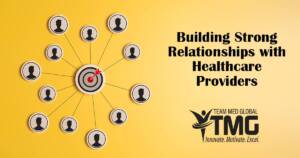 Imagine a healthcare system where every interaction between Medical Services Professionals (MSPs) and healthcare providers is seamless, efficient, and collaborative. In such a system, trust and mutual respect form the foundation, leading to smoother licensing, credentialing, and enrollment processes. This ideal scenario isn’t out of reach; it starts with building strong, lasting relationships with healthcare providers. Here’s a practical guide to forging and maintaining these essential connections, even in large organizations.
Imagine a healthcare system where every interaction between Medical Services Professionals (MSPs) and healthcare providers is seamless, efficient, and collaborative. In such a system, trust and mutual respect form the foundation, leading to smoother licensing, credentialing, and enrollment processes. This ideal scenario isn’t out of reach; it starts with building strong, lasting relationships with healthcare providers. Here’s a practical guide to forging and maintaining these essential connections, even in large organizations.
Why Relationship Building?
Strong relationships between MSPs and healthcare providers are essential for efficient operations. Providers depend on MSPs to manage critical aspects of their professional lives, from licensing to credentialing to provider enrollment. Building strong relationships leads to better communication, increased trust, and more efficient problem-solving, ultimately contributing to improved patient care.
Effective Communication
Clear and consistent communication is the foundation of any strong relationship. For MSPs, this means being proactive, transparent, and accessible. In large organizations, leveraging technology can streamline this process.
Proactive Updates: Use automated systems to send regular updates about licensing, credentialing, or enrollment status. This reduces manual workload and keeps providers informed.
Transparency: Maintain an online portal where providers can check the status of their applications and documents. This reduces the need for constant back-and-forth communication.
Accessibility: Establish clear channels for communication, such as a dedicated email address or a support hotline. Ensure providers know how to reach you for questions and concerns.
Personalized Service
While it might seem challenging to offer personalized service in large organizations, there are scalable ways to make providers feel valued.
Know Their Preferences: Implement a system to track and honor providers’ communication preferences and schedules. Even automated messages can be tailored to these preferences.
Personal Touch: Use milestone-based communications, such as congratulatory messages for major career milestones or anniversaries. These can be automated but personalized to some extent.
Building Trust
Trust is earned through consistent actions that demonstrate reliability, competence, and integrity.
Reliability: Ensure that your processes are efficient and reliable. Use technology to track tasks and deadlines to ensure timely completion.
Competence: Regularly update your knowledge of the latest industry standards, regulations, and best practices. Providing accurate and timely information builds confidence.
Integrity: Handle all information with the utmost confidentiality and professionalism. Demonstrating ethical behavior is critical for trust.
Empathy and Problem-Solving
Healthcare providers face immense pressures and challenges daily. Showing empathy and a solutions-oriented mindset can foster a supportive relationship.
Active Listening: Implement feedback mechanisms, such as surveys or suggestion boxes, to gather provider concerns and ideas. Actively address and communicate the actions taken based on this feedback.
Dedicated Support: Create a team or role specifically to handle provider issues promptly and efficiently. This ensures that providers’ concerns are addressed quickly and effectively.
Continuous Support and Education
Ongoing support and educational resources are key to maintaining strong relationships.
Educational Resources: Develop a resource hub with up-to-date information on industry changes, new regulations, and best practices. Providers can access this at their convenience.
Ongoing Support: Schedule periodic webinars or Q&A sessions to address common issues and updates. This shows a commitment to ongoing support without overwhelming your team.
Building strong relationships with healthcare providers is a multifaceted endeavor that requires effective communication, personalized service, trust, empathy, continuous support, and a commitment to improvement. By prioritizing these elements, MSPs can foster relationships that enhance operational efficiency and contribute to a more collaborative and supportive healthcare environment. Strong relationships pave the way for better provider satisfaction and ultimately, improved patient care.

